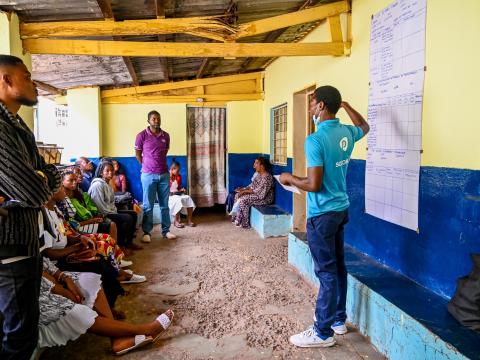DR Congo: How Are the Youth of Likasi Engaging in the Fight Against HIV Through World Vision’s CVA Approach?

In the multipurpose hall of the Likasi cluster, twenty young people and community leaders took part in an unusual five-day training dedicated to the Citizen Voice and Action (CVA) approach, a participatory methodology that places the community at the heart of local governance. The goal: to strengthen the capacity of local actors in citizen monitoring of health services, particularly those related to HIV prevention and care.
The Haut-Katanga province, especially the city of Likasi, is among the areas where HIV prevalence among young people remains high. According to data from Programme National de Lutte contre le Sida (PNLS) and World Vision (2023), 4.3% of young people aged 10 to 24 live with HIV, a rate higher than the provincial average of 2.8%. Nearly 42% of adolescents are sexually active, with 38% having their first sexual experience before the age of 15. Yet, only 7.2% know their HIV status, and barely 3.7% have adequate knowledge of the virus.
This limited awareness, combined with persistent stigma, continues to hinder access to testing and antiretroviral treatment. It is in this context that World Vision DRC, with support from World Vision Korea, launched an initiative to promote citizen participation and social accountability in the health sector.
“I realised that the fight against HIV goes beyond awareness-raising. We now have the tools to monitor service quality and to hold authorities accountable constructively. The CVA helps us become agents of change in our communities,” testified Jospin, a peer educator who took part in the training.
During the workshop, participants learned to compare national standards for HIV services with local practices. Discussions focused on issues such as testing confidentiality, availability of rapid tests, health staff training, and HIV prevention in schools.
Led by World Vision DRC’s Advocacy team, the training combined theory, practice, and field observation. The sessions included role-playing, simulations of dialogue between service providers and users, and visits to local health centres.
“The CVA approach places citizens at the heart of service improvement. It offers an opportunity for dialogue between young people, service providers, and health authorities in an atmosphere of respect and trust,” emphasised Dr. Adamo, Health and Nutrition Specialist at World Vision DRC.
Participants, including teachers, religious leaders, youth peer educators, and health workers, praised the inclusive approach. The diversity of profiles encouraged a shared understanding of HIV-related challenges and fostered a strong local synergy for action.
On the final day, a visit to the Kikula reference health centre allowed participants to observe service standards, exchange with health staff, and identify concrete areas for improvement.
“This training opened my eyes to our role in society. As a young woman, I now feel able to act to protect other girls and to speak openly about HIV without fear or judgment,” said Hadassa, a participant in the training.
For World Vision DRC, this initiative illustrates how relevant the CVA model is as a community empowerment tool. By encouraging young people to evaluate the quality of health services, the organisation helps build constructive dialogue between citizens and public institutions.
The next steps will include supporting the Likasi HIV CVA Committee in implementing its action plans, coordinating stakeholders, and capitalising on best practices to ensure the sustainability of the model.
The AY-AIDS project demonstrates that involving young people in managing their own health fosters the rise of an informed, responsible generation, one that drives social transformation. In Likasi, the mobilisation is underway, guided by one promise: a future where youth become the voice of public health.